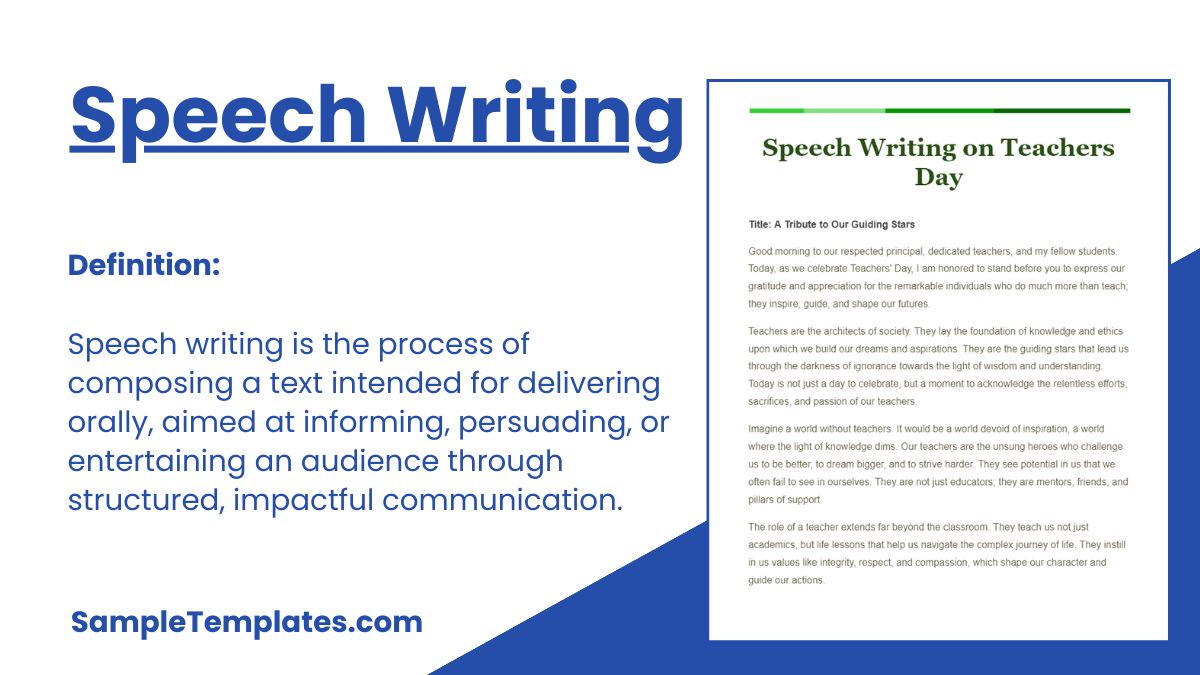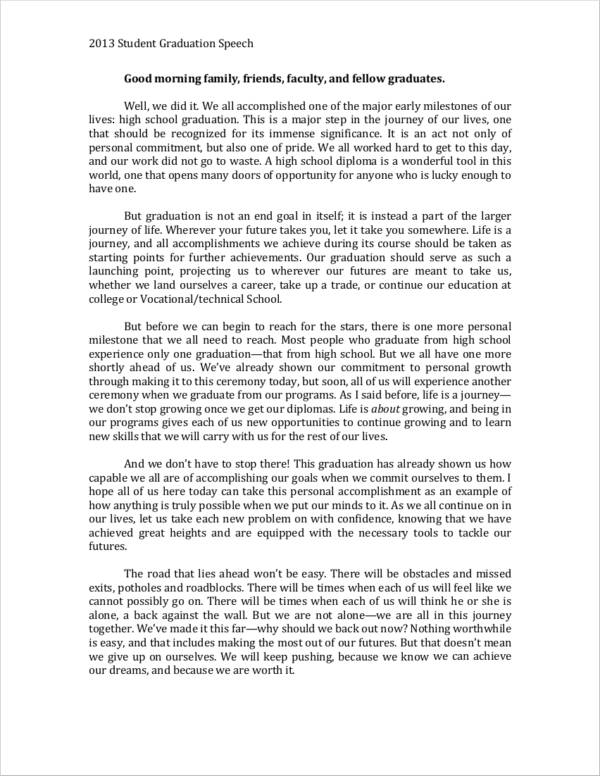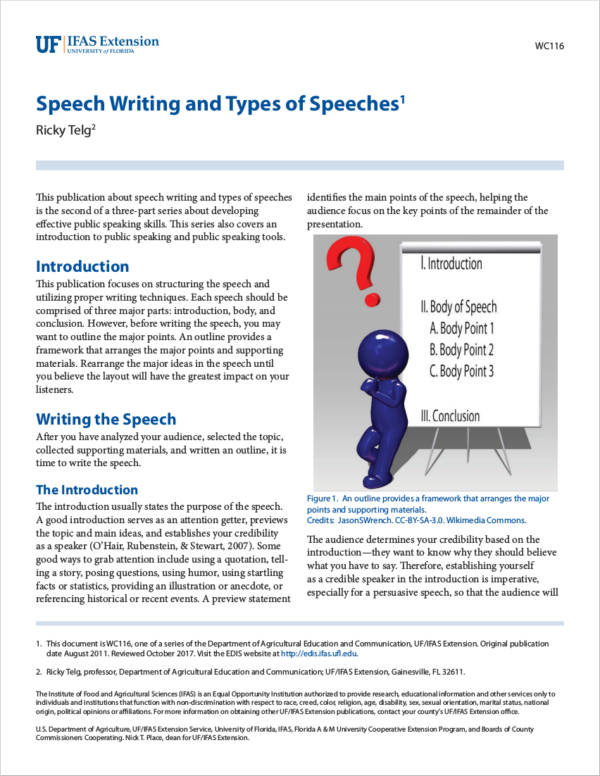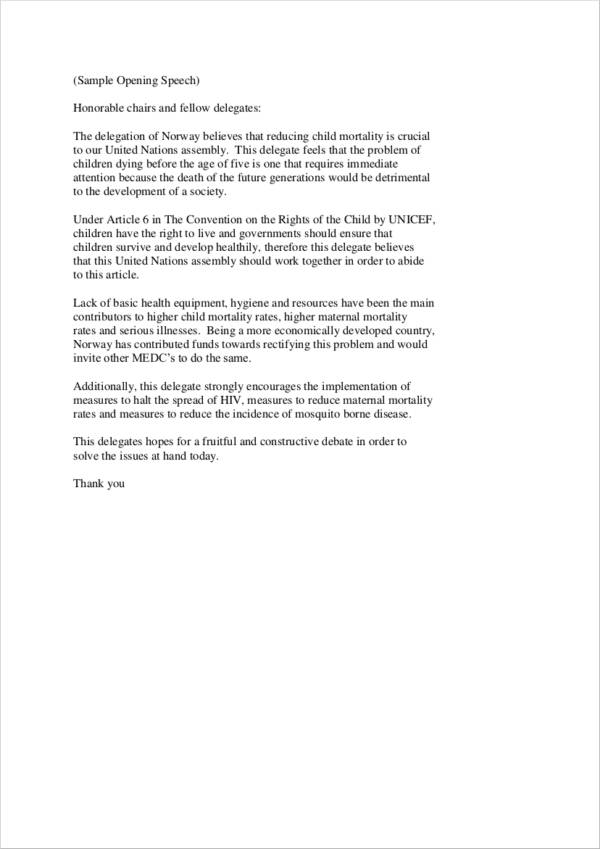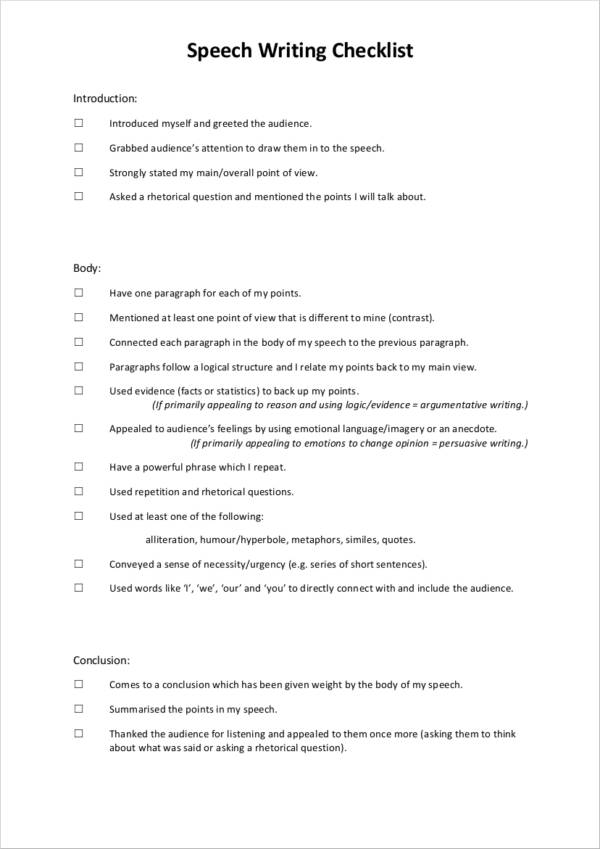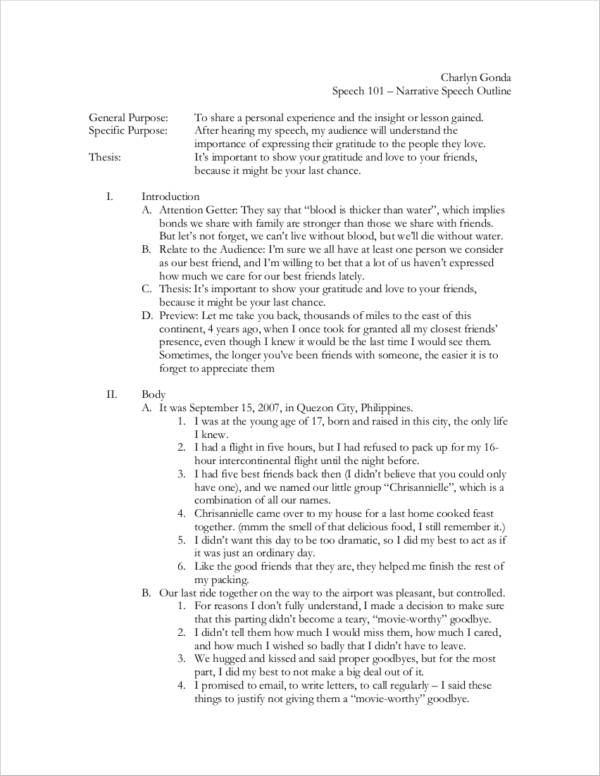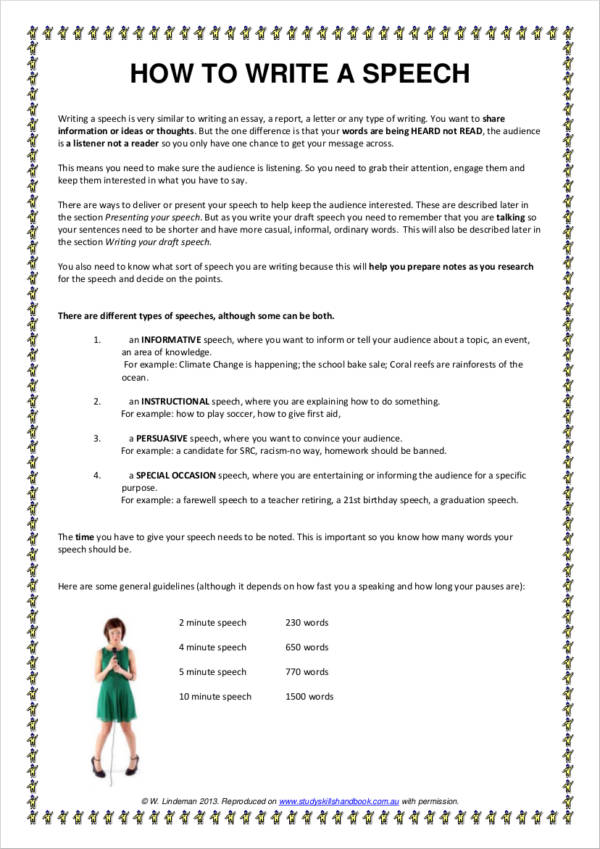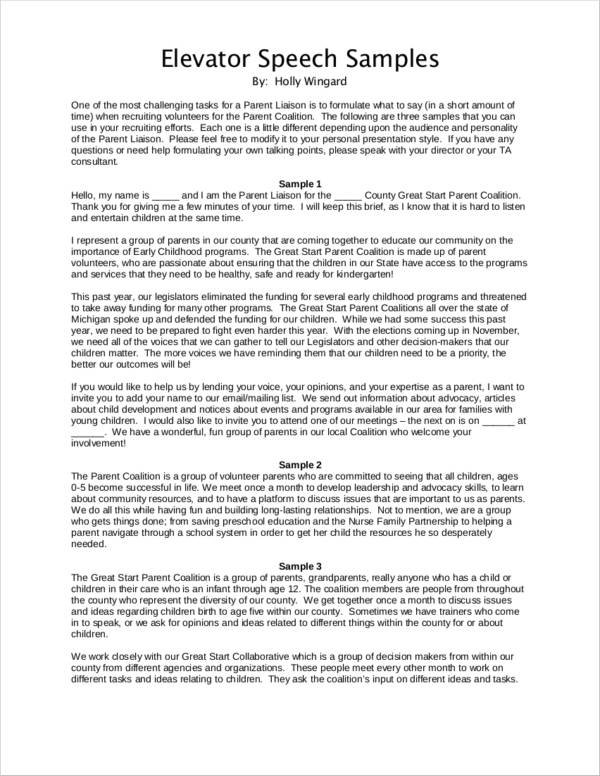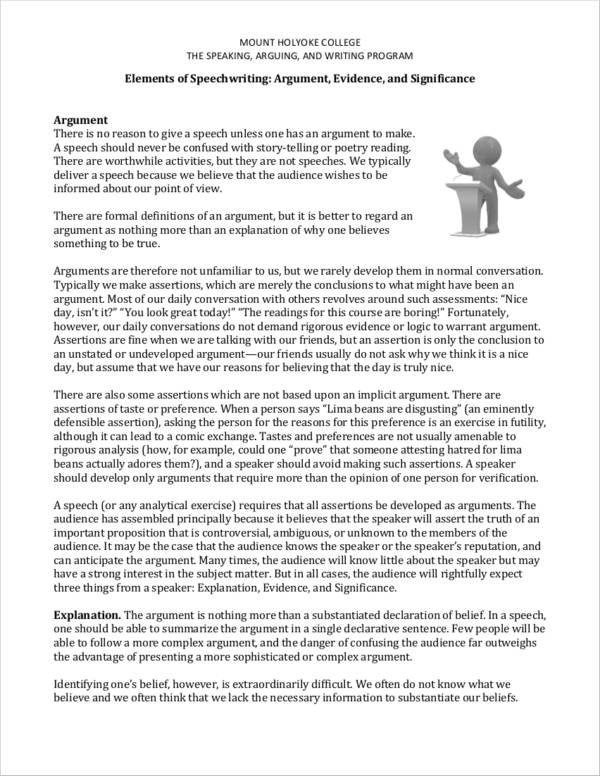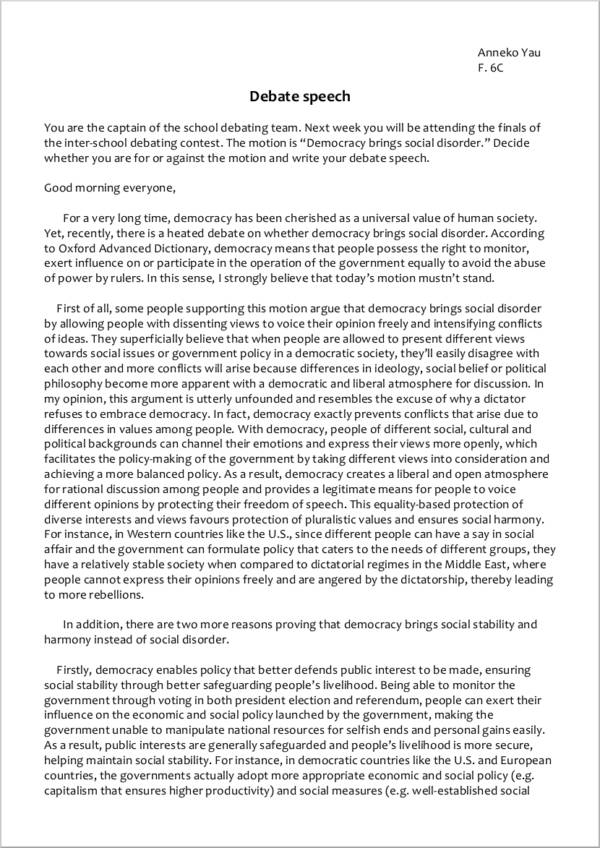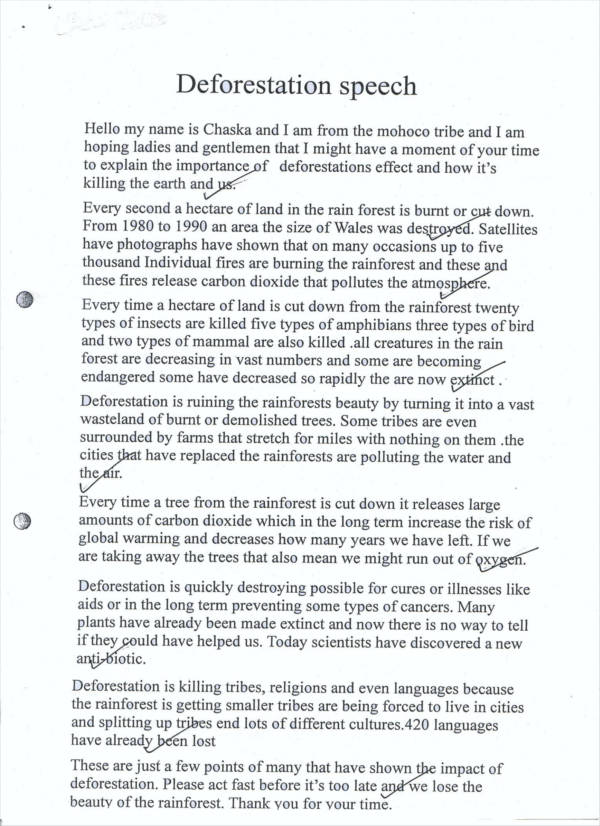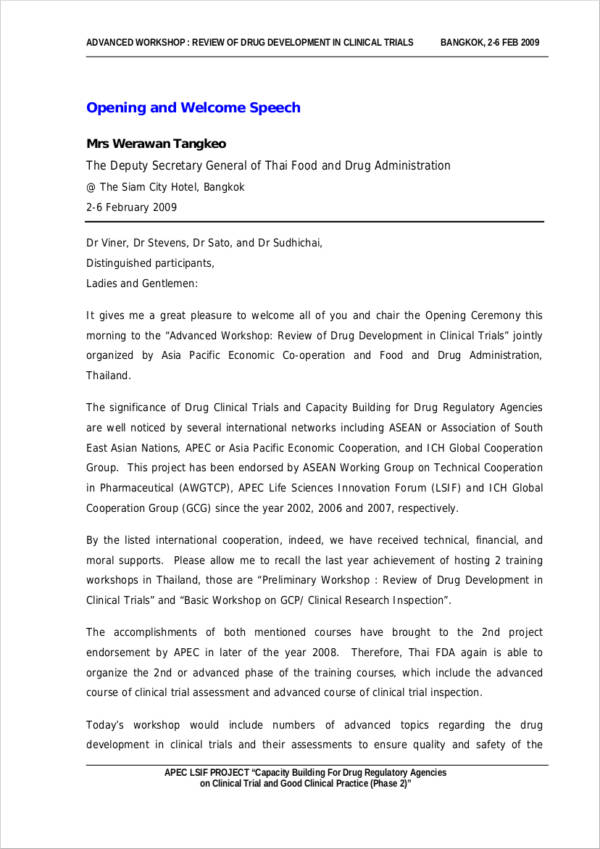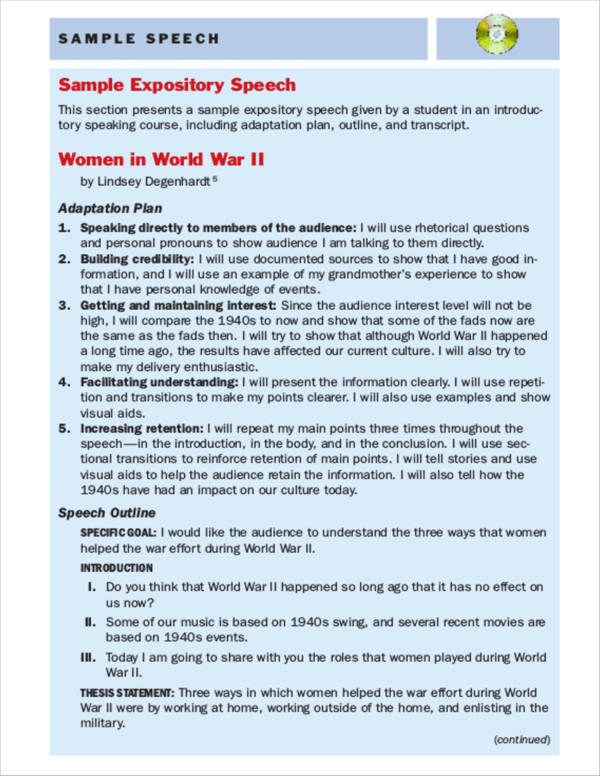At least once in your life, you may be asked to do a speech every now and then. It can either be a family gathering, a birthday, a school event plan, or even for a class requirement. It can be quite challenging to do so since after writing what you will say, you actually have to say it in front of an audience. It can be nerve-racking but it’s okay. A lot of people get nervous when it comes to giving speeches, so it is safe to say that you are not alone.
The thought of speaking in public must be turning your stomach upside down. However, before you start thinking about talking in public, you should probably be thinking about what your speech should look like. We want to help you out and give you a few tips on how to write your speech. We have also included a few speech samples and guides that you can use as further reference when you start writing your speech. Are you ready? Read up!
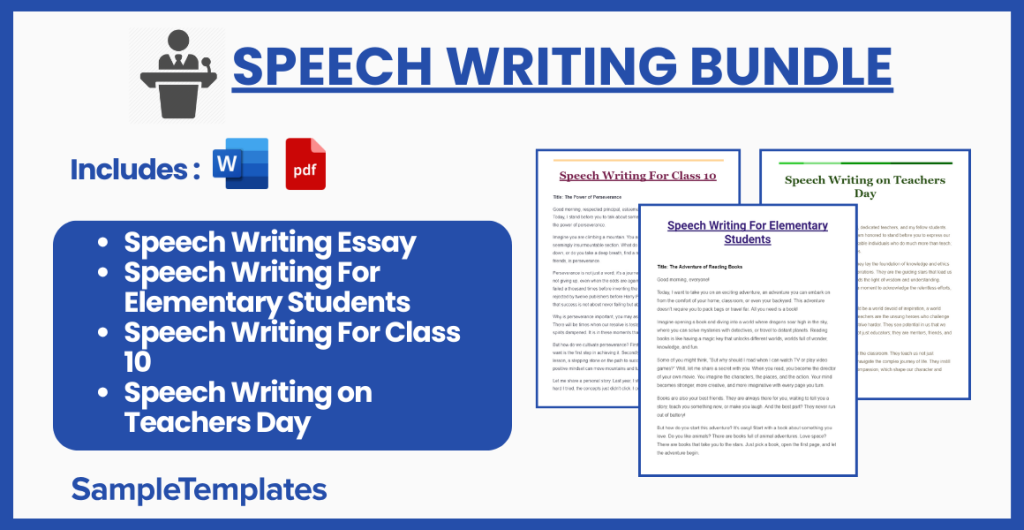
Download Speech Writing Bundle
Speech Writing Essay
Speech Writing: Mastering the Art of Effective Communication
Speech writing is a nuanced art that blends persuasion, clarity, and eloquence to convey messages compellingly. Unlike writing essays or articles, crafting a speech requires a focus on audience engagement, vocal delivery, and the power of brevity. This essay explores the essential elements of effective speech writing, offering insights into creating speeches that resonate and inspire.
Understanding Your Audience
The cornerstone of any speech is a deep understanding of the audience. A speech should be tailored to the listeners’ interests, beliefs, and level of knowledge on the topic. Knowing your audience enables you to use language, anecdotes, and examples that connect on a personal level, making your message more impactful.
Clarity of Purpose
Every speech must have a clear objective. Whether the goal is to inform, persuade, entertain, or motivate, the purpose should guide the structure and content of the speech. A well-defined objective helps in crafting a focused message that drives home the key points without meandering.
Engaging Structure
An effective speech follows a logical structure, beginning with a compelling introduction that hooks the audience. The body of the speech should present ideas or arguments in a coherent sequence, supported by evidence or storytelling. The conclusion ties everything together, reinforcing the main message and leaving the audience with a lasting impression.
The Power of Storytelling
Storytelling is a powerful tool in speech writing. Stories can humanize complex issues, evoke emotions, and make abstract concepts relatable. A well-told story can anchor your speech, providing memorable moments that linger in the audience’s minds long after the speech concludes.
Persuasive Techniques
Persuasive speeches leverage rhetorical strategies such as ethos (credibility), pathos (emotional appeal), and logos (logical argument) to convince the audience. Using these techniques judiciously can enhance the persuasive power of a speech, influencing the audience’s beliefs or actions.
Simplicity and Clarity
Simplicity is the soul of wit, especially in speech writing. Complex ideas must be distilled into clear, concise language. Avoid jargon and technical terms that might alienate the audience. The best speeches are those that express profound ideas in simple words, making them accessible to all listeners.
Rehearsal and Delivery
The effectiveness of a speech also lies in its delivery. Rehearsing the speech multiple times can refine its pacing, tone, and emphasis. Non-verbal cues, such as eye contact, gestures, and facial expressions, play a significant role in engaging the audience and enhancing the speech’s impact.
Feedback and Adaptation
Great speechwriters understand the value of feedback. Practicing in front of a trusted audience and being open to constructive criticism can uncover areas for improvement. Additionally, being adaptable and ready to tweak the speech based on audience reactions during the delivery is crucial for real-time engagement.
In conclusion, speech writing is an art that requires meticulous planning, a deep understanding of the audience, and the ability to convey messages with clarity and impact. By mastering the elements of structure, storytelling, persuasion, and delivery, speechwriters can create powerful speeches that inform, inspire, and influence. The goal is not just to speak but to be heard, understood, and remembered, making speech writing a critical skill in the arsenal of effective communication.
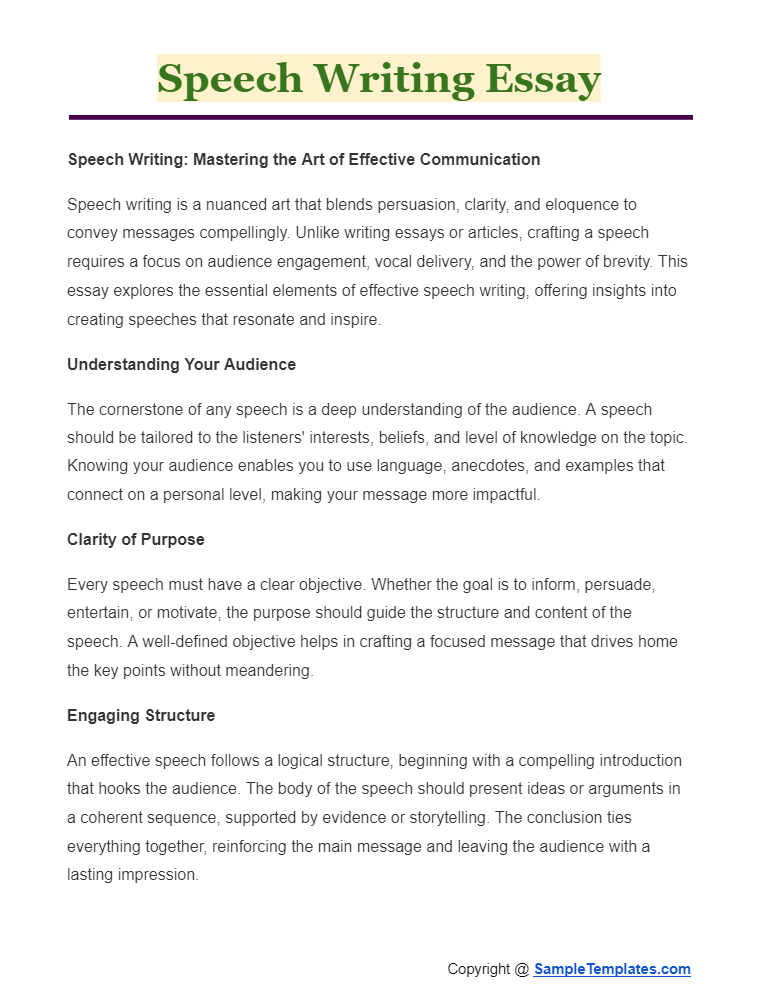
Speech Writing For Elementary Students
Title: The Adventure of Reading Books
Good morning, everyone!
Today, I want to take you on an exciting adventure, an adventure you can embark on from the comfort of your home, classroom, or even your backyard. This adventure doesn’t require you to pack bags or travel far. All you need is a book!
Imagine opening a book and diving into a world where dragons soar high in the sky, where you can solve mysteries with detectives, or travel to distant planets. Reading books is like having a magic key that unlocks different worlds, worlds full of wonder, knowledge, and fun.
Some of you might think, “But why should I read when I can watch TV or play video games?” Well, let me share a secret with you. When you read, you become the director of your own movie. You imagine the characters, the places, and the action. Your mind becomes stronger, more creative, and more imaginative with every page you turn.
Books are also your best friends. They are always there for you, waiting to tell you a story, teach you something new, or make you laugh. And the best part? They never run out of battery!
But how do you start this adventure? It’s easy! Start with a book about something you love. Do you like animals? There are books full of animal adventures. Love space? There are books that take you to the stars. Just pick a book, open the first page, and let the adventure begin.
Remember, every book you read is a step into another world. So, I encourage all of you, my fellow adventurers, to start your journey today. Pick a book and discover the magic that lies within its pages.
Thank you for listening, and happy reading!
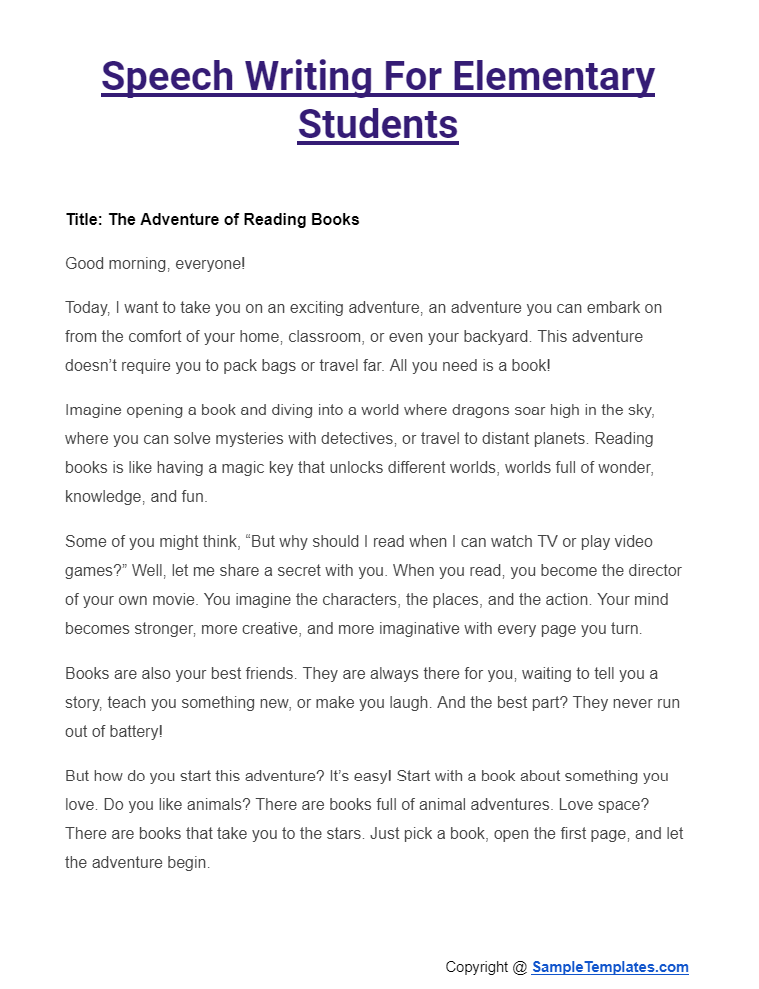
Speech Writing For Class 10
Title: The Power of Perseverance
Good morning, respected principal, esteemed teachers, and my dear classmates. Today, I stand before you to talk about something that I believe is the key to success – the power of perseverance.
Imagine you are climbing a mountain. You are halfway to the top when you hit a steep, seemingly insurmountable section. What do you do? Do you give up and slide back down, or do you take a deep breath, find a new path, and keep climbing? This, my friends, is perseverance.
Perseverance is not just a word; it’s a journey. It’s about facing challenges head-on and not giving up, even when the odds are against you. It’s about Thomas Edison, who failed a thousand times before inventing the lightbulb. It’s about J.K. Rowling, who was rejected by twelve publishers before Harry Potter was accepted. Their stories teach us that success is not about never failing but about rising every time we fall.
Why is perseverance important, you may ask? It’s because life is not a smooth journey. There will be times when our resolve is tested, our patience stretched thin, and our spirits dampened. It is in these moments that the strength of our character is forged.
But how do we cultivate perseverance? Firstly, by setting clear goals. Knowing what you want is the first step in achieving it. Secondly, by embracing failure. Each failure is a lesson, a stepping stone on the path to success. And lastly, by staying positive. A positive mindset can move mountains and turn dreams into reality.
Let me share a personal story. Last year, I struggled with mathematics. No matter how hard I tried, the concepts just didn’t click. I considered giving up many times. But instead, I sought help, spent extra hours on practice, and gradually, the puzzles began to fit. My perseverance turned my weakest subject into one of my strongest.
In conclusion, remember that perseverance is a choice. It’s easy to give up, but it takes courage to push through the challenges and keep going. As Winston Churchill once said, “Success is not final, failure is not fatal: It is the courage to continue that counts.”
So, to all my friends here today, let’s make a pledge to persevere, no matter what. Let’s climb our mountains, reach the top, and then, find higher mountains to conquer. Because in the end, it is perseverance that makes us winners.
Thank you.
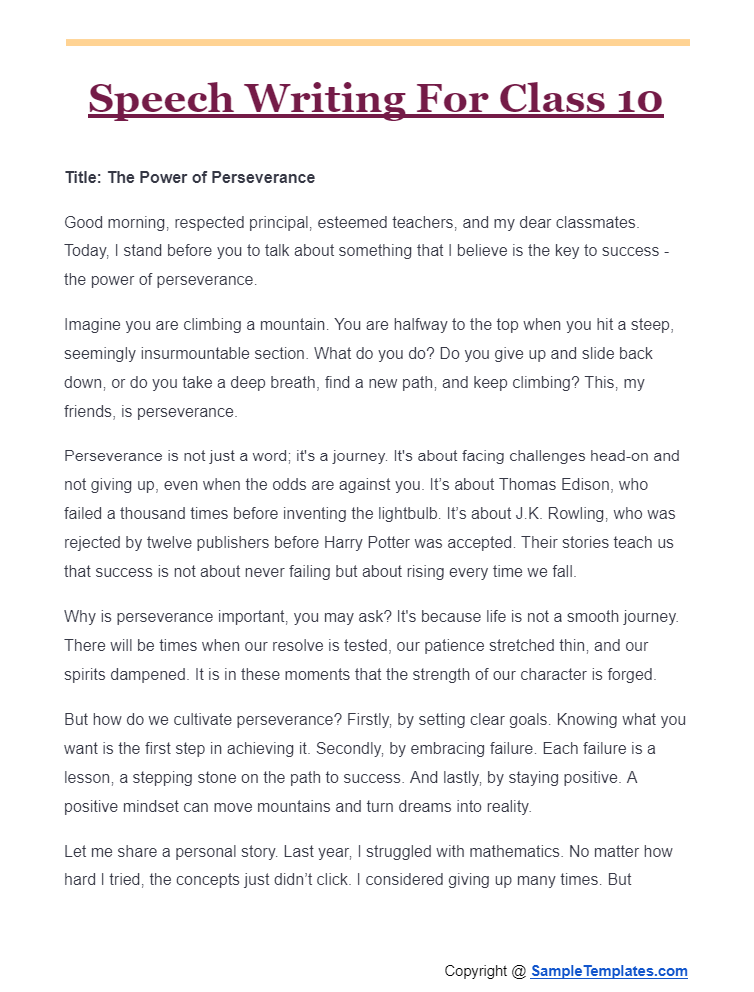
Speech Writing on Teachers Day
Title: A Tribute to Our Guiding Stars
Good morning to our respected principal, dedicated teachers, and my fellow students. Today, as we celebrate Teachers’ Day, I am honored to stand before you to express our gratitude and appreciation for the remarkable individuals who do much more than teach; they inspire, guide, and shape our futures.
Teachers are the architects of society. They lay the foundation of knowledge and ethics upon which we build our dreams and aspirations. They are the guiding stars that lead us through the darkness of ignorance towards the light of wisdom and understanding. Today is not just a day to celebrate, but a moment to acknowledge the relentless efforts, sacrifices, and passion of our teachers.
Imagine a world without teachers. It would be a world devoid of inspiration, a world where the light of knowledge dims. Our teachers are the unsung heroes who challenge us to be better, to dream bigger, and to strive harder. They see potential in us that we often fail to see in ourselves. They are not just educators; they are mentors, friends, and pillars of support.
The role of a teacher extends far beyond the classroom. They teach us not just academics, but life lessons that help us navigate the complex journey of life. They instill in us values like integrity, respect, and compassion, which shape our character and guide our actions.
On this special day, let us take a moment to thank our teachers for their invaluable contributions. Let us thank them for the patience with which they handle our questions, the enthusiasm with which they share knowledge, and the dedication with which they are committed to our success. Our achievements are a direct reflection of their hard work and belief in us.
To all the teachers who have touched our lives in myriad ways, thank you. Thank you for the early mornings and late nights, for the lessons planned and the grades given, for the smiles shared and the tears wiped away. Your influence extends far beyond the walls of this school; it touches the heart of every student you’ve taught.
As we move forward in our lives, let us carry the lessons learned from our teachers with pride and gratitude. Let us be a testament to their dedication and a tribute to their legacy.
In closing, I would like to quote Henry Adams, “A teacher affects eternity; he can never tell where his influence stops.” Our teachers are the heart and soul of our educational journey, and on this Teachers’ Day, we celebrate and honor them for being our guiding stars.
Thank you, teachers, for everything.
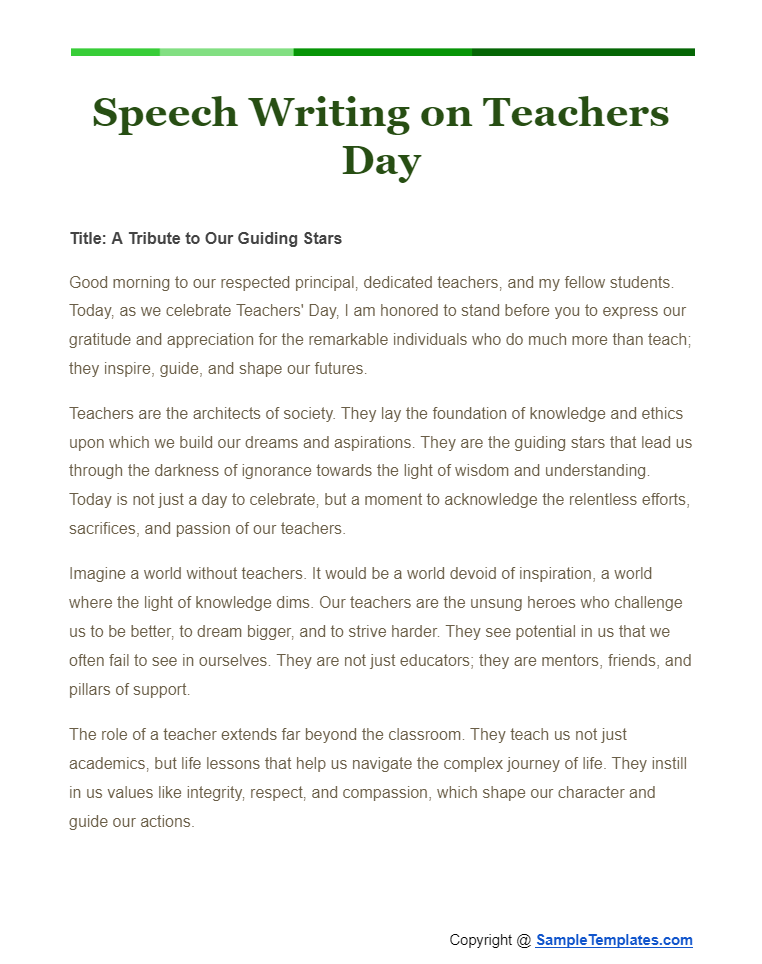
Browse More Templates On Speech Writing
Speech Writing Examples
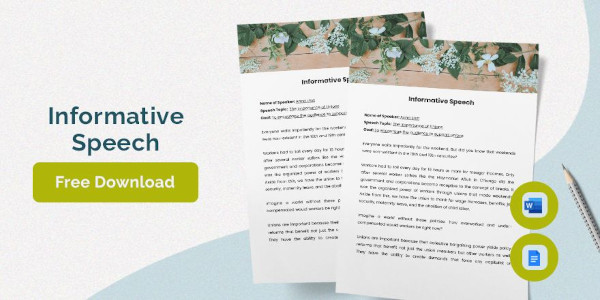
Speech Writing Examples for Students
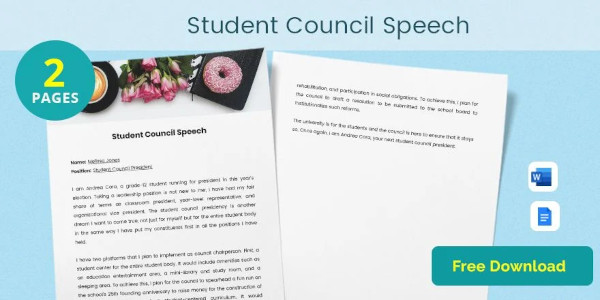
Short Speech Writing Examples
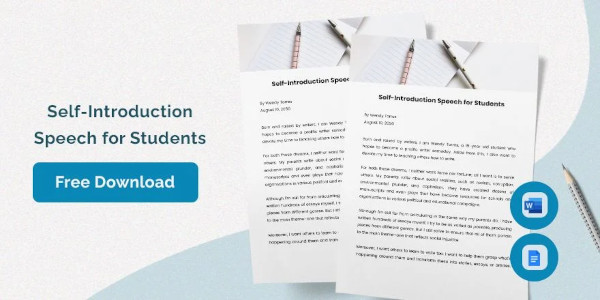
Speech Writing
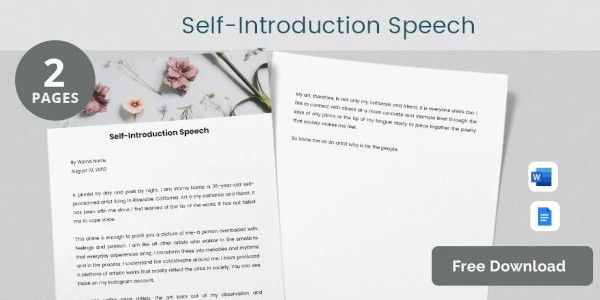
Sample of Speech Writing
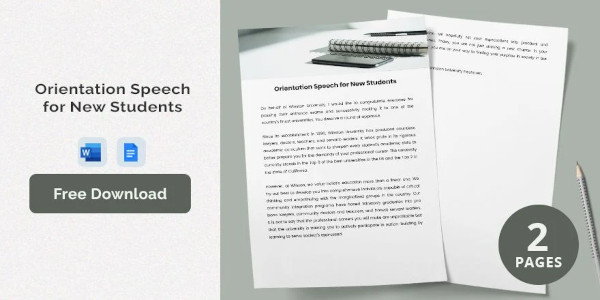
Speech Writing Examples for Students PDF
How Do I Start My Speech?
- Engaging Hook: Begin with a compelling story, quote, or question to capture the audience’s attention.
- Relevance: Establish the speech’s relevance to the audience, making them interested in what follows.
- Clear Purpose: Clearly state the speech’s purpose or main message to provide focus from the outset.
- Humor or Anecdote: Incorporate humor or a relevant anecdote to create a connection and set a positive tone.
- Acknowledgment: Acknowledge the audience or the occasion, fostering a sense of connection and shared experience.
Speech Writing PDF
How to Write a Speech Example
How Do you Start a 2 Minute Speech?
- Captivating Opening: Begin with a compelling quote, surprising fact, or a thought-provoking question to grab the audience’s attention.
- Clear Purpose: Clearly state the purpose or main idea of your speech to set the tone for the next two minutes.
- Relevance: Connect your topic to the audience’s interests or experiences, making it immediately relatable.
- Engaging Tone: Use a confident and engaging tone to establish a connection with your listeners from the start.
Speech Writing PDF Download
Narrative Speech Examples
What is the First Stage in Speech Writing?
The first stage in speech writing is Preparation and Planning. During this crucial phase, the speaker defines the purpose of the speech, identifies the target audience, and establishes key messages. Research is conducted to gather relevant information and supporting evidence. Understanding the occasion, setting, and desired impact helps shape the tone and style. The speaker also considers the appropriate structure, organizing ideas logically. This initial stage lays the foundation for a coherent and impactful speech, ensuring that the subsequent drafting and delivery phases are guided by a well-thought-out sample plan that aligns with the communication goals and resonates effectively with the audience.
Format of Speech Writing
What Is a Speech?
Before we start digging deep into the details of how to start writing that speech, we should first start with some of the basics. Let us first define what is a speech.
Speech is a group of sample statements that an individual says in front of an audience. It is typically practiced whenever said individual is in a public gathering. The individual can be someone running for a political office, managers looking to inspire their subordinates, or businessman or leader. Most of the time, the purpose of saying a speech is to inspire or to create tension within the group.
Types of Speeches
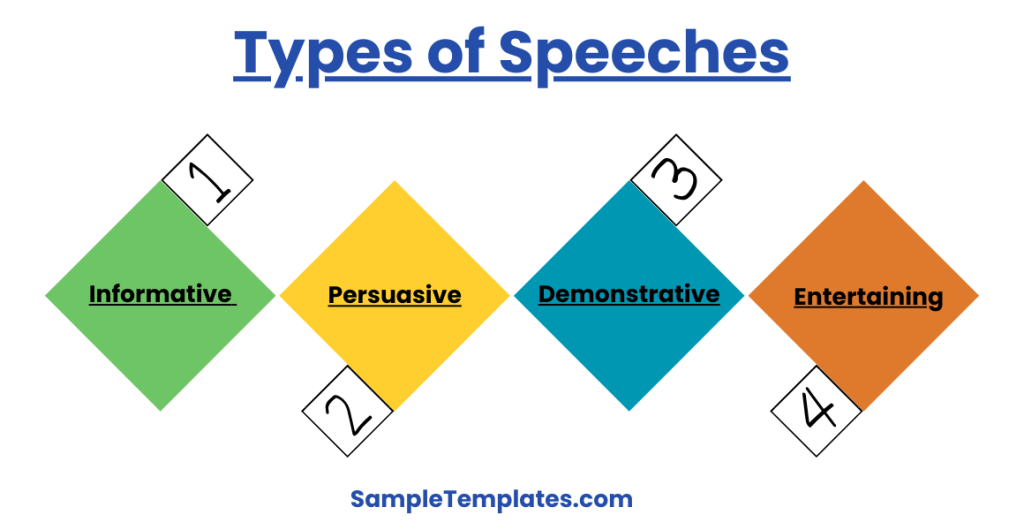
Speeches come in various forms, each designed to serve a specific purpose or address particular audiences. Here’s a rundown of some common types of speeches:
1. Informative Speech
An informative speech, from the word informative, aims to provide the audience information about a specific topic or subject. With these types of speeches, you want to make sure that your audience is able to understand and remember what you have shared with them.
Topics discussed whenever informative speeches are utilized are the following:
- person,
- event,
- concept, or
- process.
If you are looking to write this type of speech, you can check out Sample Informative Speech for more sample reference.
2. Persuasive Speech
Persuasive speeches aim to convince an audience that what they are saying or what they are trying to relay to them is what is correct. A ton of times, these speeches try to challenge the beliefs of an individual. A ton of times, political figures or those who are running for office are the ones who make use of these speeches.
There are three types of persuasive speech:
- Questions of Fact. This type of persuasive speech is able to prove and disprove facts such as the stock market.
- “Will the stock market be better in the next 5 years?”
- Questions of Policy. This persuasive speech aims to give a solution to a certain problem. This speech would typically answer the question, “What should we do?”
- Questions of Value. This speech would gauge the goodness or the badness of a specific thing. You typically choose a side and explain why you choose that side.
If you choose to make a persuasive speech, you have to be ready for any backlash that may come as there would be people who will disagree with your ideas and stand. With this being said, you should be sure that you prepare counter agreements for some of the common comments that you might receive.
You can check out Persuasive Speech Examples to have a better idea regarding how this type of speech is structured.
3. Demonstrative Speech
- Also known as a demonstration speech, it teaches the audience how to perform a task or procedure. It’s essentially a step-by-step guide that includes explanations along with visual aids.
4. Entertaining Speech
- Focused on entertaining the audience, this type of speech is often light-hearted, amusing, and aimed at capturing and holding the audience’s attention. It’s common in social gatherings and celebrations.
5. Motivational Speech
- Designed to inspire and motivate the audience to improve themselves, change their behavior, or strive towards certain goals. Motivational speeches often include personal stories, successes, and failures.
6. Debate Speech
- Used in a formal debate setting, where speakers present arguments for or against a specific statement, policy, or idea. Debate speeches require presenting facts, logic, and evidence to support one’s position while refuting the opposition’s arguments.
7. Extemporaneous Speech
- Delivered with little preparation, extemporaneous speeches are somewhat impromptu but allow for brief notes or outlines. The speaker relies on knowledge and spontaneity to engage the audience.
8. Farewell Speech
- Given when someone is leaving a place, position, or group, farewell speeches reflect on the time spent, express gratitude, and wish well for the future.
9. Acceptance Speech
- Delivered when receiving an award or honor, acceptance speeches express gratitude, acknowledge the contributions of others, and sometimes share a brief personal story or reflection.
10. Commemorative Speech
- Aimed at paying tribute to a person, group, institution, or event, commemorative speeches celebrate values, achievements, and memories, often delivered during ceremonies or anniversaries.
When you start thinking about which types you should be using, think first of the setting where you will be making your speech or think about what your objective for making the speech. To make it easier for you to decide which one to choose, we will sample brief discuss each type of speech for you.
Sample Speech
Speech Writing Elements Template
How to Write a Speech?
You have to make sure that when you start writing your speech that you are able to write it properly. So to help you out with that, we are here to give you a guideline and a few tips regarding how to write your speech.
1. Basic Preparations
- Choose your topic well. You want to make sure that you are able to focus properly on what you want to convey. Aside from trying to make it match the event or occasion, you also have to make sure that it will appeal to the interest of the audience. Make sure that you also pick a topic that you deem is important to the audience. However, if you find yourself not having the luxury of being able to choose your own topic, make sure that you research the topic well and that you seem enthusiastic when it comes to your delivery.
- Make sure that you are able to find what the purpose of the speech is. You should know why you are delivering this speech of yours. Make sure that you state this in a way that will inspire, instruct, or be able to lead to an action.
- Be organized. One way of doing this would be to prepare speech outline templates. This way you will know what you will be including in the introduction, the body, and the conclusion. By organizing your thoughts, your audience will be able to follow what your main point is and they will understand that you are not just babbling a messy string of thoughts and that you want them to properly comprehend what you are trying to relay.
- When it comes to the body of the speech, you can state at least three main points and make good arguments for each point. Make sure that they are in line or that they flow smoothly together. End with the most important point to make it more memorable to the audience.
- Be persuasive. Whether you are writing a persuasive speech or not, make sure that you make your arguments sound. You can do this by stating facts and stating references that would make your speech and arguments more solid.
2. Make Your Speech Effective
- Choose your words wisely. Match the words you will be using with that of your audience. If you are writing a speech for 10th graders, make sure that you use words that are at par with their comprehension. You should take time to explain concepts that they have yet to know and give them a brief background of these concepts in order to widen their perspective regarding your topic.
- Insert a hook. Make sure that you are able to catch the audience’s attention by inserting interesting phrases. You can do this in the introduction of your speech. If you are able to start strong, you will be able to build an sample agreement with most of the audience.
- Remember to focus. Avoid straying away from the topic. You want to ensure that all throughout your speech, you are focused on the message that you are trying to convey. You should avoid rambling or else you start losing the attention of the audience and you will also confuse them with what your main message is.
- Make it seem natural. Never make it seem like you are just reading off a piece of sample paper. Insert a few pauses especially the points that you would like to point out. This way they will be able to remember these points. During delivery, you can change your tone during these parts.
3. Forming the Speech Proper
- Open with a big statement. This will be your hook and this is what will keep your audience interested in what you have to say. You can go for famous quotes, anecdotes, or interesting facts. You can take a look at Introduction Speech Samples for reference.
- Make the audience a part of your speech. Instead of using “I,” use “we” or other collective nouns. This way, the audience will feel like they are a part of what you are relaying.
- Build arguments properly. Start with a strong point, followed by your weakest one, and end with another strong point.
- Be aware of your transitions. Make sure that each paragraph is coherent with the previous one and the next one. This way, the audience will not get confused.
- End strong. If you start strong, you also have to end strong. Reiterate a few points and summarize what you were trying to convey.
Now that you know a little bit more about writing speeches, we hope that you get to apply these. Make sure that you also hand your first draft to someone to read in case you miss any misspellings, inconsistencies, and grammatical errors.
You can check out Speech Formats for a better understanding of how you can format your speech.
Debate Speech Example
What Makes a Good Speech
A good speech captivates its audience, conveying messages clearly and impactfully. Here are key elements that contribute to the effectiveness of a speech:
1. Clear Purpose
- Every speech should have a clear objective, whether it’s to inform, persuade, motivate, or entertain the audience.
2. Engaging Opening
- A strong start grabs the audience’s attention immediately, setting the tone for the rest of the speech.
3. Structured Content
- Organizing the speech with a clear introduction, body, and conclusion makes it easier for the audience to follow and understand the message.
4. Relevance to the Audience
- Tailoring the speech to the interests, needs, and level of understanding of the audience ensures that it resonates and is engaging.
5. Persuasive Elements
- For speeches aiming to persuade, using evidence, logical arguments, and emotional appeals strengthens the case being made.
6. Vivid Language
- Utilizing vivid language and storytelling can make the speech more memorable and impactful, helping to illustrate points more effectively.
7. Appropriate Pace and Tone
- Adjusting the pace and tone according to the speech’s content and the audience’s mood can significantly enhance its effectiveness.
8. Confident Delivery
- Confidence in delivery, including eye contact, body language, and voice modulation, keeps the audience engaged and conveys authority.
9. Use of Visuals (if applicable)
- Appropriately using visuals or other aids can enhance understanding and retention of information.
10. Memorable Conclusion
- Ending with a strong conclusion that reinforces the main message or calls to action leaves a lasting impression on the audience.
11. Practice and Preparation
- Thorough preparation and practice help in delivering the speech smoothly and managing any nerves.
12. Feedback and Adaptation
- Being open to feedback and willing to adapt based on the audience’s reactions can make a speech more effective in real-time.
A good speech combines these elements in a balanced way, tailored to the specific context and purpose. The most memorable speeches are those that not only convey information but also evoke emotions and prompt action, leaving a lasting impact on the audience.
Printable Student Speech Template
What are the Features of a Speech?
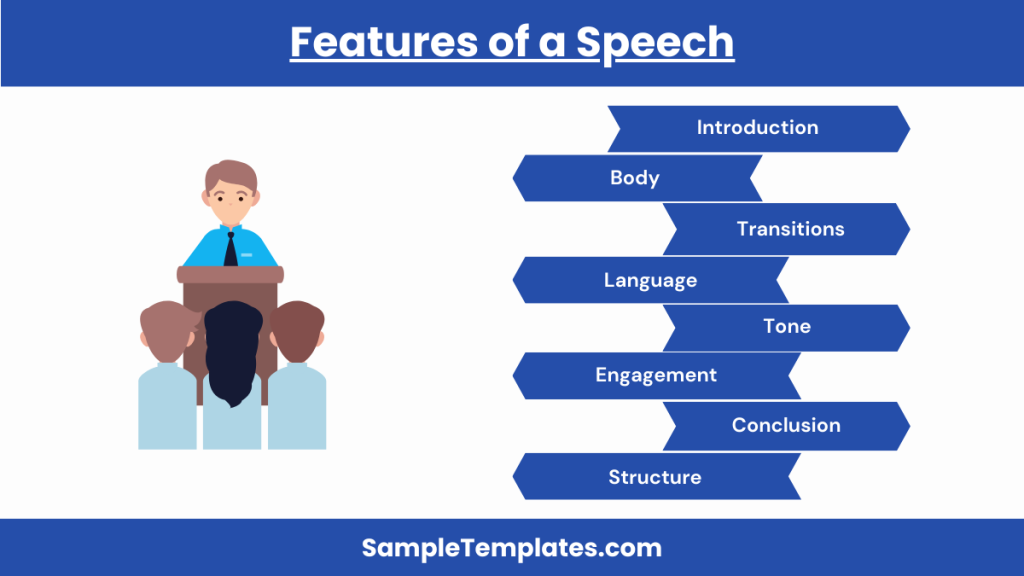
- Introduction: Captures attention and outlines the speech’s purpose.
- Body: Presents main ideas, arguments, or key points.
- Transitions: Smoothly connects different sections for coherence.
- Language: Clear, concise, and tailored to the audience.
- Tone: Appropriate for the subject and audience.
- Engagement: Interacts with the audience, encouraging participation.
- Conclusion: Summarizes main points and leaves a lasting impression.
- Structure: Follows a logical and organized format.
- Delivery: Varied pace, tone, and gestures for emphasis.
- Relevance: Addresses audience interests and concerns.
Welcome Speech Template
Tips For Speech Writing
Speech writing is an art that combines structure, creativity, and clarity to communicate messages effectively. Here are some tips to help you write compelling speeches:
1. Know Your Audience
- Understanding who your audience is, their interests, and their level of knowledge about the topic is crucial. Tailor your language, tone, and content accordingly.
2. Define Your Purpose
- Be clear about what you want to achieve with your speech. Whether it’s to inform, persuade, entertain, or inspire, your purpose should guide your content.
3. Start Strong
- Open with a hook that grabs attention, such as a provocative question, a startling fact, a quote, or a personal anecdote.
4. Structure Your Speech
- Organize your speech with a clear introduction, body, and conclusion. This helps in keeping your message coherent and guiding the audience through your speech.
5. Use Simple Language
- Avoid jargon and overly complex sentences. Clear and concise language makes your speech more accessible and easier to follow.
6. Incorporate Stories and Examples
- Stories, anecdotes, and examples can make your speech more engaging and memorable. They help illustrate your points and connect emotionally with your audience.
7. Vary Your Tone and Pace
- Changes in tone and pace can help maintain interest. They emphasize key points and help manage the energy of your delivery.
8. Include a Call to Action
- If your speech’s goal is to persuade or motivate, conclude with a clear call to action. Tell the audience what you want them to do.
9. Practice Makes Perfect
- Rehearse your speech multiple times. This will help you become more familiar with your content, manage your pacing, and refine your delivery.
10. Seek Feedback
- If possible, practice in front of a trusted person who can give constructive feedback. Use this sample feedback to improve your speech.
11. Use Visual Aids Wisely
- If your speech includes visual aids, ensure they complement your message without distracting from it. Keep slides simple, clear, and to the point.
12. Be Prepared for Questions
- If there’s a Q&A session, prepare for potential questions. Being well-prepared shows confidence and authority on the subject.
13. End Strongly
- Your conclusion should reinforce your main message, summarize key points, or leave the audience with something to ponder.
Remember, a great speech is not just about delivering information; it’s about making an impact, evoking emotions, and sometimes inspiring change. Tailoring your message to your audience, and delivering it with clarity and passion, can make your speech memorable and effective.
Expository Speech Writing Template
What is a Simple Speech?
A simple speech is a concise and straightforward address that conveys a clear message. It avoids complexity, using plain language to ensure easy understanding by the audience.
What is Body Speech?
Body speech refers to non-verbal communication through gestures, postures, and facial expressions. It conveys emotions, intentions, and emphasis, enhancing the spoken message and fostering effective interpersonal communication.
What is a Informative Speech?
An informative speech aims to educate or impart knowledge on a specific topic to the audience. It provides factual information, often breaking down complex concepts into understandable and accessible content.
What is Written Speech Called?
A written speech is called a transcript, manuscript, or script. It’s a pre-prepared text that serves as a guide for the speaker, ensuring clarity and coherence during delivery.
Is Speech Writing a Skill?
Yes, speech writing is a valuable skill. It involves crafting engaging, coherent, and impactful messages tailored to a specific audience, requiring a blend of creativity, communication, and organizational abilities.
What is Conclusion in Speech?
The conclusion in a speech is a concise summary of key points, reinforcing the main message. It leaves a lasting impression, often incorporating a call to action or a memorable statement.
In conclusion, effective speech writing requires meticulous sample planning, engaging content, and skillful delivery. By understanding the audience, structuring the speech logically, and incorporating persuasive language, speakers can captivate listeners and convey their message with impact and clarity.
Related Posts
Timetable
Training Evaluation Forms
Acceptance Speech
Scientific Reports Samples & Templates
Attendance List Samples & Templates
Sample Meeting Minutes Templates
Presentation Speech Samples & Templates
Ukulele Chord Chart Samples & Templates
Retirement Speech Samples & Templates
Weekly Schedule Samples & Templates
Contractual Agreement Samples & Templates
FREE 9+ Amazing Sample Church Bulletin Templates in PSD | PDF
Sample Business Card Templates
Sample Cashier Job Descriptions
Questionnaire Samples
